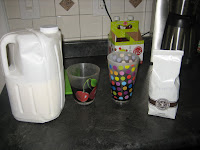Are mycotoxins ruining the health benefits of coffee? A fair-balance discussion
Does the coffee you drink every day have mycotoxins? Yes,
according to researchers. Mycotoxins are naturally occurring mold toxins found
in susceptible grains, nuts, beer, wines and coffees. Their presence and concentrations depend on
various conditions---humidity levels, temperature, rainfall and storage
conditions.
There are dozens of
types of mycotoxins; however, regulators and health advocates are most concerned
about ochratoxin A (OTA). OTA is naturally occurring and highly prevalent.
Medical researchers have linked excess OTA exposure with liver cancer, renal
failure and neurotoxicity that may lead to Alzheimer’s disease (AD) and
Parkinson’s disease.
If every person on earth were tested for OTA, 100% of us
would test positive. It’s not whether we are consuming OTA, but how much we are
consuming. The OTA-in-coffee issue has stoked controversy and disagreement
between those who are concerned that the U.S. Department of Agriculture is too
lax, and those who point to evidence (from Europe) showing that most commercial
samples of coffee have only 2% to 3% of the level regarded as safe.
The mycotoxins-in-coffee controversy has been growing since
around 2000 when researchers started to publish their fndings. Widely different
approaches to analytical batch testing have made it difficult to determine how
much OTA is present and whether it exceeds regulatory guidelines.
After years of being maligned, coffee has undergone an image
revolution. Instead of being publicly linked with breast cancer, pancreatic
cancer and various types of psychological disorders, coffee has now been
established as beneficial for many different organ systems.
However, recognition of coffee as something other than a
helpful vice is relatively new. Historically, coffee has gotten a bad rap. At various times, coffee has been
associated with cancer, infertility, “neurasthenia”, miscarriage, and heart
attacks. In one memorable editorial published in Science Magazine in
1890, a researcher suggested that people who drank large amounts of coffee
suffered from widespread bodily inflammation, had an intense aversion to work
of any kind, and could die if denied coffee.
So the pendulum has
swung from negative to positive in terms of the public perception of coffee,
but the issue of mycotoxins and OTA is far from resolved. Researchers continue
to refine OTA testing techniques while coffee growers and others involved in
the business seek to optimize conditions to decrease the level of OTA in
coffee---since it will most likely never be completely eliminated from the
global coffee supply.
On the upside, all
of the positive research on coffee shows that benefits related to coffee
consumption exist despite the problem of OTA contamination. In fact, drinking coffee is associated with a
decreased risk of liver cancer, AD and Parkinson’s disease---the three things
that researchers have targeted as potential outcomes of OTA exposure.
You can be sure that at least some of the coffee you consume has traces of OTA, but you can also be sure that coffee is being more aggressively tested by regulators worldwide, and that coffee growers and others in the business are taking measures to decrease the threat of naturally occurring toxins in our beloved brew.




Comments